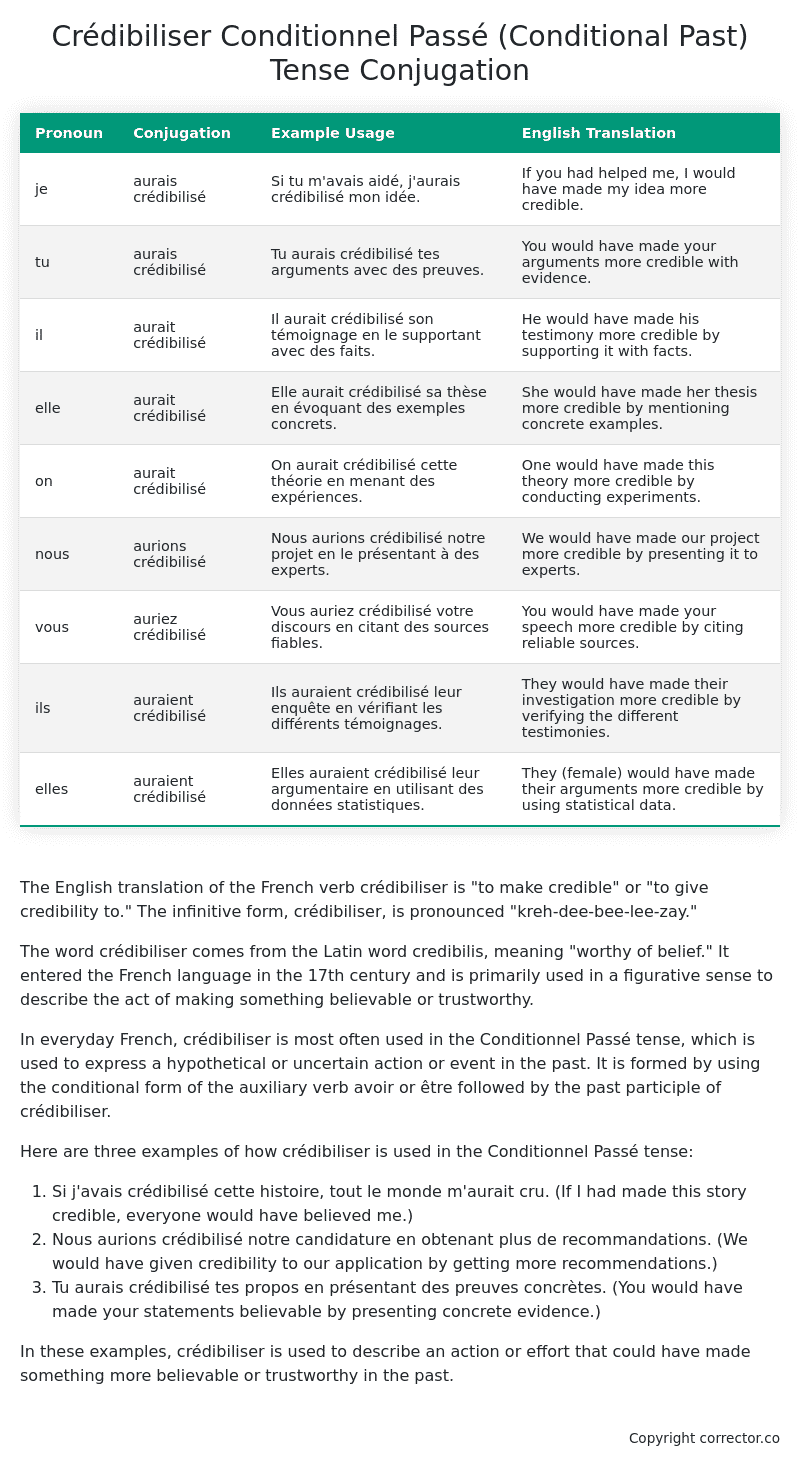Conditionnel Passé (Conditional Past) Tense Conjugation of the French Verb crédibiliser
Introduction to the verb crédibiliser
The English translation of the French verb crédibiliser is “to make credible” or “to give credibility to.” The infinitive form, crédibiliser, is pronounced “kreh-dee-bee-lee-zay.”
The word crédibiliser comes from the Latin word credibilis, meaning “worthy of belief.” It entered the French language in the 17th century and is primarily used in a figurative sense to describe the act of making something believable or trustworthy.
In everyday French, crédibiliser is most often used in the Conditionnel Passé tense, which is used to express a hypothetical or uncertain action or event in the past. It is formed by using the conditional form of the auxiliary verb avoir or être followed by the past participle of crédibiliser.
Here are three examples of how crédibiliser is used in the Conditionnel Passé tense:
- Si j’avais crédibilisé cette histoire, tout le monde m’aurait cru. (If I had made this story credible, everyone would have believed me.)
- Nous aurions crédibilisé notre candidature en obtenant plus de recommandations. (We would have given credibility to our application by getting more recommendations.)
- Tu aurais crédibilisé tes propos en présentant des preuves concrètes. (You would have made your statements believable by presenting concrete evidence.)
In these examples, crédibiliser is used to describe an action or effort that could have made something more believable or trustworthy in the past.
Table of the Conditionnel Passé (Conditional Past) Tense Conjugation of crédibiliser
| Pronoun | Conjugation | Example Usage | English Translation |
|---|---|---|---|
| je | aurais crédibilisé | Si tu m’avais aidé, j’aurais crédibilisé mon idée. | If you had helped me, I would have made my idea more credible. |
| tu | aurais crédibilisé | Tu aurais crédibilisé tes arguments avec des preuves. | You would have made your arguments more credible with evidence. |
| il | aurait crédibilisé | Il aurait crédibilisé son témoignage en le supportant avec des faits. | He would have made his testimony more credible by supporting it with facts. |
| elle | aurait crédibilisé | Elle aurait crédibilisé sa thèse en évoquant des exemples concrets. | She would have made her thesis more credible by mentioning concrete examples. |
| on | aurait crédibilisé | On aurait crédibilisé cette théorie en menant des expériences. | One would have made this theory more credible by conducting experiments. |
| nous | aurions crédibilisé | Nous aurions crédibilisé notre projet en le présentant à des experts. | We would have made our project more credible by presenting it to experts. |
| vous | auriez crédibilisé | Vous auriez crédibilisé votre discours en citant des sources fiables. | You would have made your speech more credible by citing reliable sources. |
| ils | auraient crédibilisé | Ils auraient crédibilisé leur enquête en vérifiant les différents témoignages. | They would have made their investigation more credible by verifying the different testimonies. |
| elles | auraient crédibilisé | Elles auraient crédibilisé leur argumentaire en utilisant des données statistiques. | They (female) would have made their arguments more credible by using statistical data. |
Other Conjugations for Crédibiliser.
Le Present (Present Tense) Conjugation of the French Verb crédibiliser
Imparfait (Imperfect) Tense Conjugation of the French Verb crédibiliser
Passé Simple (Simple Past) Tense Conjugation of the French Verb crédibiliser
Passé Composé (Present Perfect) Tense Conjugation of the French Verb crédibiliser
Futur Simple (Simple Future) Tense Conjugation of the French Verb crédibiliser
Futur Proche (Near Future) Tense Conjugation of the French Verb crédibiliser
Plus-que-parfait (Pluperfect) Tense Conjugation of the French Verb crédibiliser
Passé Antérieur (Past Anterior) Tense Conjugation of the French Verb crédibiliser
Futur Antérieur (Future Anterior) Tense Conjugation of the French Verb crédibiliser
Subjonctif Présent (Subjunctive Present) Tense Conjugation of the French Verb crédibiliser
Subjonctif Passé (Subjunctive Past) Tense Conjugation of the French Verb crédibiliser
Subjonctif Imparfait (Subjunctive Imperfect) Tense Conjugation of the French Verb crédibiliser
Conditionnel Présent (Conditional Present) Tense Conjugation of the French Verb crédibiliser
Conditionnel Passé (Conditional Past) Tense Conjugation of the French Verb crédibiliser (this article)
L’impératif Présent (Imperative Present) Tense Conjugation of the French Verb crédibiliser
L’infinitif Présent (Infinitive Present) Tense Conjugation of the French Verb crédibiliser
Struggling with French verbs or the language in general? Why not use our free French Grammar Checker – no registration required!
Get a FREE Download Study Sheet of this Conjugation 🔥
Simply right click the image below, click “save image” and get your free reference for the crédibiliser Conditionnel Passé tense conjugation!

Crédibiliser – About the French Conditionnel Passé (Conditional Past) Tense
Formation
Common Everyday Usage Patterns
Expressing Unreal Past Scenarios
Polite Requests or Suggestions
Expressing Doubt or Uncertainty
Interactions with Other Tenses
Conditional Present
Indicative Past Tenses
Conditional Future
Summary
Want More?
I hope you enjoyed this article on the verb crédibiliser. Still in a learning mood? Check out another TOTALLY random French verb conjugation!


